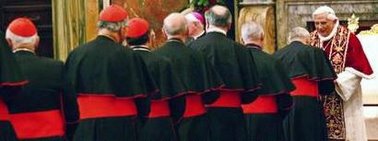
Seven days after the Pope's breathtaking December 22 speech to the Roman Curia (see here and here), it is still quite embarrassing to see the almost silent reaction of the English-speaking media and weblogs, with few honorable exceptions.
Fortunately, at the center of the Catholic world, the most influential Church commentators have written important articles on this epoch-making speech, including Vittorio Messori in Corriere della Sera, Andrea Tornielli in Il Giornale, and the already-linked Sandro Magister, in L'Espresso.
There is no doubt whatsoever in my mind that this remarkable address, which is historic (mark this word), was directed towards those of us who identify themselves as "Traditional" Catholics, those intimately attached to the Traditional Roman Liturgy, many of whom also have some problems with the documents of the last Ecumenical Council.
Why do I believe Traditional Catholics, especially those in a somewhat "uncertain" situation, were the pope's audience? First, a simple view of the speech shows that its most important part is incoherent with its beginning, which is a mere retrospective of the events of 2005, as if it had been inserted later, for a specific purpose and a different audience. Second, because, after presenting the different hermeneutics of the Council (one, acceptable, the "hermeneutics of reform and continuity"; the other, unacceptable, the "hermeneutics of rupture and discontinuity", the self-avowed "Spirit of the Council"), the pope presents two issues that are of adamant importance to Traditional Catholics: (1) relations with the people of the Old Covenant and (2) Religious Liberty.
Now, these are only two among the dozens of issues present in the Conciliar documents. They are certainly important, but there is only one reason why the pope would isolate these two issues, among so many others, in his speech: he was speaking to a specific audience, an audience which was not simply the one present in the Clementine Hall of the Apostolic Palace.
Beyond the Vatican walls, the Pope was speaking to the Catholic world at large and his "niche audience" were those who have faced personal, conscience-bound, problems with some of the terms and concepts used by the Conciliar documents. The Pope spoke to them and wanted to reassure them that he knows their problems and wishes to ease their concerns.
Fortunately, at the center of the Catholic world, the most influential Church commentators have written important articles on this epoch-making speech, including Vittorio Messori in Corriere della Sera, Andrea Tornielli in Il Giornale, and the already-linked Sandro Magister, in L'Espresso.
There is no doubt whatsoever in my mind that this remarkable address, which is historic (mark this word), was directed towards those of us who identify themselves as "Traditional" Catholics, those intimately attached to the Traditional Roman Liturgy, many of whom also have some problems with the documents of the last Ecumenical Council.
Why do I believe Traditional Catholics, especially those in a somewhat "uncertain" situation, were the pope's audience? First, a simple view of the speech shows that its most important part is incoherent with its beginning, which is a mere retrospective of the events of 2005, as if it had been inserted later, for a specific purpose and a different audience. Second, because, after presenting the different hermeneutics of the Council (one, acceptable, the "hermeneutics of reform and continuity"; the other, unacceptable, the "hermeneutics of rupture and discontinuity", the self-avowed "Spirit of the Council"), the pope presents two issues that are of adamant importance to Traditional Catholics: (1) relations with the people of the Old Covenant and (2) Religious Liberty.
Now, these are only two among the dozens of issues present in the Conciliar documents. They are certainly important, but there is only one reason why the pope would isolate these two issues, among so many others, in his speech: he was speaking to a specific audience, an audience which was not simply the one present in the Clementine Hall of the Apostolic Palace.
Beyond the Vatican walls, the Pope was speaking to the Catholic world at large and his "niche audience" were those who have faced personal, conscience-bound, problems with some of the terms and concepts used by the Conciliar documents. The Pope spoke to them and wanted to reassure them that he knows their problems and wishes to ease their concerns.
The Challenge for Traditional Catholics
Peter has given the first step. We must not simply reject him, because he has not offered all that we expected. He has extended his hand; will we reach him or will we live in a world of unrealistic expectations and uncharitable condemnations? The challenge for Traditional Catholics is to reach the Petrine hand.
I intend to present the papal view of these two main issues in the next few days. The American, Latin-American, and European (non-Italian) media may want to silence the pope or drown his crucial words among the several messages he has spoken in this Advent and Christmastide period, but it is our duty to listen to the DIFFERENT words he has spoken, to those which address the critical moment through which the Church is going.